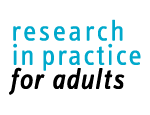Audio exercise
You can use this audio file as an example of a reviewing conversation and critique it.
Audio: Reviewing conversations
(.MP3 format, size: 6.5MB)
Why is it important?
Personal outcomes are identified through good conversations with people using services during assessment and support planning. It is also critical that the outcomes are reviewed, to ensure the continued relevance of support and services and to support service-planning, commissioning and improvement (Miller and Cook, 2012).
The Critical Reflection domain of the PCF requires, at all levels of competence, that
“Social workers are knowledgeable about and apply the principles of critical thinking and reasoned discernment. They identify, distinguish, evaluate and integrate multiple sources of knowledge and evidence. These include practice evidence, their own practice experience, service user and carer experience together with research-based, organisational, policy and legal knowledge. They use critical thinking augmented by creativity and curiosity.” (College of Social Work, 2015)
Conversations about outcomes are rarely, if ever, a one-off. They are an on-going dialogue between the practitioner and the person. Regular reflection and review are central to keeping the conversation focused and effective over time, benefiting both the practitioner and person.
Reflection is the ability to draw on existing experience and knowledge so you can respond to new things. Reflective practice involves:
- Looking back retrospectively at something which has happened or
- looking forward prospectively and asking questions about what might happen
- reflecting in action or ’thinking on your feet’.
In social work, reflection involves elements of self-assessment of practice and looking at learning from experience and identifying the potential for learning and development (Boud et al, 1985).
Here are a few suggestions of opportunities to increase reflective practice:
- Self-reflection – awareness of yourself and your strengths and weaknesses, gathering feedback from the people you are supporting
- Peer reflection – having conversations with peers, formal or informal, to support sharing of good practice and consistency of approach
- Learning from research and evaluation – looking at findings and thinking how these could be applied in your situation or how you could have acted differently
- CDP and personal development plans– identifying where you want more support or learning
- Structured reflection e.g. looking at case studies, action learning sets, working through cases with others
- Supervision is also a really good forum for reflection.
There are a number of tools below which can help you reflect on or assess you own practice.
Tools
![]() Practitioner audit (PDF file 217KB). This audit is taken from our popular Good Assessment Handbook, and supports assessors to audit their assessment practice by looking at their own assessments. It identifies how far best practice in assessment is met.
Practitioner audit (PDF file 217KB). This audit is taken from our popular Good Assessment Handbook, and supports assessors to audit their assessment practice by looking at their own assessments. It identifies how far best practice in assessment is met.
![]() Learning needs analysis (PDF file 217KB). Also taken from our Good Assessment Handbook, the learning needs analysis allows you to rate your capability of assessment practice.
Learning needs analysis (PDF file 217KB). Also taken from our Good Assessment Handbook, the learning needs analysis allows you to rate your capability of assessment practice.
![]() Getting the most out of supervision (PDF file 1MB). This resource helps you identify aspects of good supervision and enables you to develop these aspects in practice.
Getting the most out of supervision (PDF file 1MB). This resource helps you identify aspects of good supervision and enables you to develop these aspects in practice.
![]() What difference are we making? Action learning and action research (PDF file 600KB). These tools enable practitioners to address issues within their own practice by building their individual and organisational capacity to learn and contribute to the evidence base of ‘what works’.
What difference are we making? Action learning and action research (PDF file 600KB). These tools enable practitioners to address issues within their own practice by building their individual and organisational capacity to learn and contribute to the evidence base of ‘what works’.





